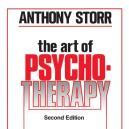The Art of Psychotherapy is a really good, but most of all, interesting and very clearly written book for all those interested in discovering the inner world. For all who want to create, to evolve. And for all those who are aware that their lives can be significantly improved. Of course, problems and difficulties will arise all the time, and there is no one, even among psychotherapists, psychiatrists, and psychologists, who would not have problems. This book lets the reader know clearly and vividly how he can get to know, accept, and live with himself.
The book “The Art of Psychotherapy” is by no means just for those who are or will one day become psychotherapists.
If a man discovers himself, investigates his stunts and defenses that no longer serve him, and tries to figure out why he is constantly entangled in the same types of relationships, he may find it easier to explain himself if he reads chapters that talk about hysterical personality, depressed, obsessive and schizoid. Storr’s thoughts discovered many things in a whole new way.
Depressive, obsessive, hysterical, and schizoid are the types of people we place against normal people. At the same time, the question of whether normal people even exist swings over our heads over and over again. We are mostly mixed, but knowing what is prevalent in our inner world is good. What traits, defenses, or stumbling blocks that drive us into, over and over again, seemingly egg-to-egg-like events and relationships?
And for the End, Important Insight Into the Book “The Art of Psychotherapy.”
Storr first argues that man cannot develop and be satisfied without loving and being loved. Still, at the book’s place, he somehow acknowledges that development, that progress through change, and thus satisfaction, can also be achieved through creative work. There, man seeks solutions that take him forward and give him hope and momentum. Perhaps through creativity, stuck is also resolved.
It also emphasizes the importance of solitude. Some people don’t need solitude, yet others fear it; others cannot miss it. He suggests it because it is necessary for self-knowledge.